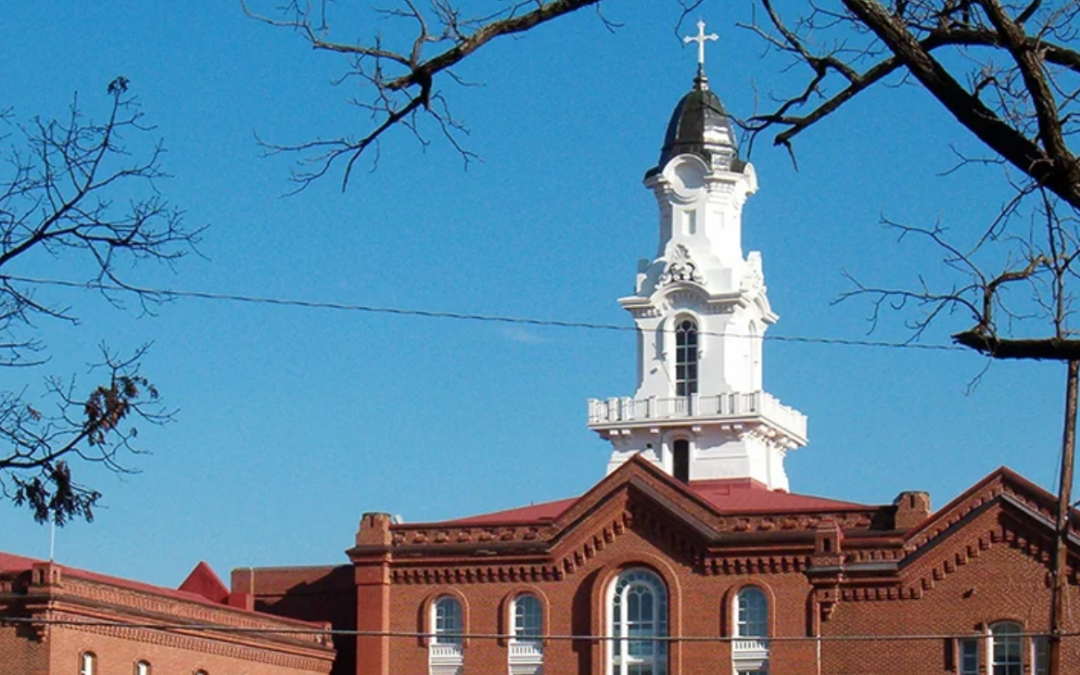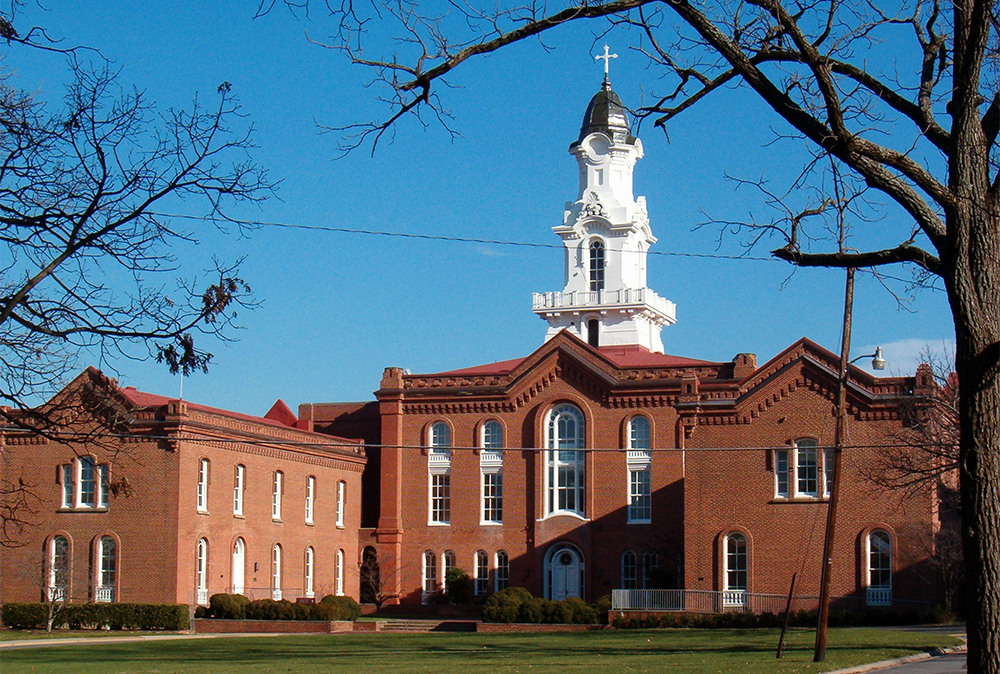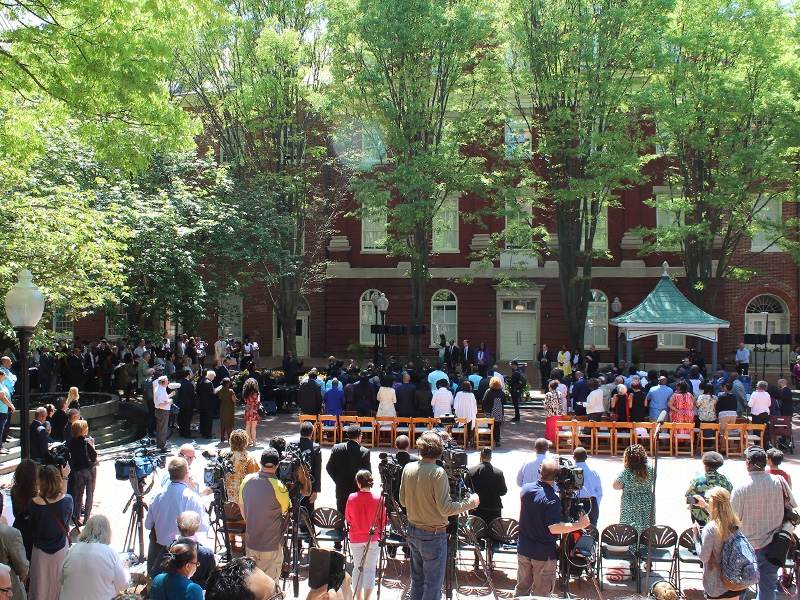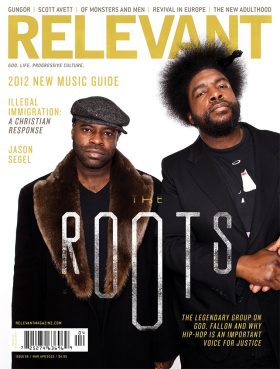
by Adelle M. Banks, RNS | Sep 21, 2019 | Social Justice |

An Episcopal seminary in Virginia has announced plans to create a $1.7 million endowment fund whose proceeds will support reparations for the school’s ties to slavery.
Virginia Theological Seminary said that enslaved persons worked on its campus and the school “participated in segregation” after the end of slavery.
“This is a start,” said the Very Rev. Ian S. Markham, president of the Alexandria-based seminary, in the statement. “As we seek to mark (the) Seminary’s milestone of 200 years, we do so conscious that our past is a mixture of sin as well as grace. This is the Seminary recognizing that along with repentance for past sins, there is also a need for action.”
A spokesman for the seminary said officials know of three buildings on its campus that were built with slave labor, including Aspinwall Hall, where the dean’s and admissions offices are located.
“We do want to honor those who worked in this place and we want to provide financial resources for their descendants,” said Curtis Prather, the seminary’s director of communications. “The Office of Multicultural Ministries will take the lead in the exhaustive research that will need to take place.”

Aspinwall Hall at Virginia Theological Seminary was one of three buildings on campus built with slave labor. Photo by John W. Cross/Creative Commons
The seminary, which was founded in 1823 but admitted its first African American student in 1951, raised the funds for the endowment with a capital campaign. School officials estimate that they will spend $70,000 annually from accumulated interest on reparations.
The decision comes as other institutions of higher learning, some with ties to religion, have mulled whether to offer forms of reparations or not.
In 2017, Georgetown University apologized for its involvement in the 1838 sale of more than 270 enslaved persons that kept the Catholic-run school from bankruptcy. The school renamed two buildings that once honored former university presidents who were priests and supporters of the slave trade. A year earlier, Georgetown announced that it would give preferential status in the admissions process to descendants of the enslaved people who had been owned by Maryland Jesuits.
Jennifer Oast, author of “Institutional Slavery: Slaveholding Churches, Schools, Colleges, and Businesses in Virginia, 1680-1860,” said the seminary’s “momentous announcement” is more noteworthy than the nonbinding vote by Georgetown students in the spring to add a student fee whose proceeds would benefit the descendants of the slaves sold more than a century and a half ago.
Georgetown spokesperson Meghan Dubyak said the school’s board of directors will not have an “up or down” vote on the student referendum but “will engage thoughtfully and with the most careful consideration of the issues” raised by it.

Crowds of slave descendants and Georgetown University students and staffers gather for a dedication ceremony of two buildings at the school that were renamed, one in honor of a slave sold by Maryland Jesuits, and another for a free black woman educator, on April 18, 2017. RNS photo by Adelle M. Banks
“To my knowledge, this is the most substantial direct financial reparations effort by a university,” said Oast, chair of the history department at Bloomsburg University in Pennsylvania. “What makes this action by VTS more significant is that it has been undertaken by the university itself, and is fully funded.”
Quardricos Driskell, who teaches religion and politics at George Washington University’s Graduate School of Political Management, agreed.
“VTS would by definition be the first to have a fund — a University-established led form of reparations,” Driskell, pastor of Beulah Baptist Church, located about three miles from the seminary, told Religion News Service in an email message.
Other institutions have chosen to recognize their connections to slavery without making monetary reparations. Last year, Southern Baptist Theological Seminary, a flagship institution of the Southern Baptist Convention in Louisville, Kentucky, released a report about its founders condoning slavery and owning slaves, but six months later denied a request from an interracial ministers coalition for financial support for a nearby black college.
Virginia Theological Seminary currently has an enrollment of about 200 master’s and doctoral level students.
The school intends to determine with stakeholders how the income from the endowment fund will be distributed. It said some of it will be allocated to descendants of enslaved persons who worked at the seminary and to assist the work of African American alumni, especially those involved with historic black churches. It also plans to encourage African American clergy in the Episcopal Church and support programs that promote inclusion and justice.
“Though no amount of money could ever truly compensate for slavery, the commitment of these financial resources means that the institution’s attitude of repentance is being supported by actions of repentance that can have a significant impact both on the recipients of the funds, as well as on those at VTS,” said the Rev. Joseph Thompson, director of the seminary’s Office of Multicultural Ministries, in a statement.
“It opens up a moment for us to reflect long and hard on what it will take for our society and institutions to redress slavery and its consequences with integrity and credibility.”

by Adelle M. Banks and Jack Jenkins, RNS | Sep 21, 2019 | Headline News |

Cameron Strang, the founder and CEO of Relevant Media Group, found himself under attack from a host of former employees this week who accused him of behavior they said was racially insensitive and changed depending on his mood.
Relevant Media publishes a Christian bimonthly geared toward young evangelicals, as well as a website and a network of podcasts.
It was the allegation of racial insensitivity that came in a Twitter barrage on Wednesday (Sept. 18) after Relevant recommended a podcast episode about race and the church on the social media platform.
In reply, Andre Henry, an African American writer who served as Relevant’s managing editor from October 2017 through July 2018, shot back: “Several experiences & stories from my time at @RELEVANT … convince me the org is not committed at all to creating an antiracist culture internally to produce a race podcast with integrity.
“Nor do they honor Black people,” he added.
Henry followed his tweet with a blog post on Medium, titled “Black Christians Deserve Better Than Companies (And Churches) Like Relevant Media Group.”
“The company is in need of the very information they wish to publish for others,” Henry wrote.

Recent Relevant magazine covers. Screengrabs
Henry’s retorts spurred a stream of online testimonies from people who used to work for Strang, both African American and white, men and women, who registered indignation about what some called a toxic environment that they say Strang created. They described a workplace in which Strang exhibited various levels of high-handedness, shouting fits and racially insensitive slights.
On its website Friday (Sept. 20), Relevant issued a statement, headlined, “RELEVANT’s Stand on Racial Justice,” explaining that the magazine had reached out to Henry to apologize.
“In our conversations with him,” the statement said, “he discussed ways we could improve our corporate culture, and based on his insights, we are looking into options to continue improving and create systems to ensure every member of our team has a positive experience.”
After the statement brought further criticism over the course of the day, Strang appeared to delete his Twitter account.
In an interview with Religion News Service, Henry, who now works for Evangelicals for Social Action and hosts a podcast called “Hope and Hard Pills,” described Relevant’s office culture as not outright hostile to people of color — “no one’s using racial slurs,” he said — and added the staff included a range of writers.
But he said that the company’s commitment to diversity was more cosmetic than genuine.

Andre Henry. Video screengrab
“They have done well at appearing to be about racial justice,” said Henry. “They post the right things. They say the right things. They make sure that they have a good mix of people of color in the magazine and on the web, but I don’t think that in their practices as an organization that they honor people of color in that way.”
In his blog post, Henry said the beginning of the end of his tenure at Relevant came after a run-in he had with Strang over coverage of Black History Month.
Henry had planned a month’s worth of content related to the topic, but Strang reportedly warned him not to “waste editorial energy” and complained the site would have to post seven or eight articles each day online to “offset” one article about race, he said.
Not long afterward, Henry wrote, he was “stripped of all decision-making power.”
While he kept his title as managing editor, responsibility for web articles was given to the outlet’s brand manager and articles in the magazine to its contributing editor.

The March/April 2012 issue of Relevant, featuring The Roots on its cover. Screengrab
Ryan Hamm, who worked at Relevant as an editor and managing editor from 2009 to 2012, told Religion News Service of an incident in which members of the editorial staff, including Strang, were discussing the poor newsstand sales of an issue of the magazine that featured an image of the band The Roots on the cover.
“(Strang) said, as I recollect, ‘Well maybe our audience doesn’t want to see scary black men on the cover of Relevant,’” said Hamm, who is now employed at a nonprofit that fights religious persecution. “As soon as he said that, (I thought), ‘If that’s true, then I have no interest in writing for this audience, and I’m done.’”
Rebecca Flores, who preceded Henry as managing editor and whose pen name is Rebecca Marie Jo, wrote in a blog post published Friday that Henry’s post validated her own experiences.
She recounted a meeting in which Strang suggested running an image of a black Christian rapper with a noose around his neck as a “shocking image to symbolize his lynching by white evangelical America” after the rapper was criticized for his support of the Black Lives Matter movement.
Flores, who is Latina, said that she told Strang that she found the idea deeply troubling and offensive.
“Listen. I’m telling you, as a person of color, that if I was reading this magazine, whoa is not the reaction I would have. I would be deeply disturbed. And alienated,” she said. “We do not need to publish an image of a Black man in a noose. This isn’t a good idea.”
Flores said the incident made her feel “like I was in a trap I wouldn’t get out of safely.”
She said Strang “was obviously annoyed with me, and I left trying to hide my exhaustion towards this environment.”
RNS reached out to Strang for comment and to corroborate accounts from former staffers, but he did not immediately respond.
Strang, the son of Charisma magazine publisher Stephen Strang, founded Relevant Media Group in Orlando, Florida, in 2000, when he was 24 years old. As hip as his father’s magazine was religiously conservative, the sleekly designed magazine and website heralded unorthodox Christian heroes from the rock and literary world such as Bob Dylan and the rock band U2, about whom the publishing enterprise also issued adulatory spiritual and musical biographies.
Offering a glimpse of God in popular culture, Relevant’s magazine alone claimed a readership of more than 100,000 by the mid-2000s and had become a guide to navigating mainstream American culture for a generation of young Christian adults venturing out of the evangelical bubble.
But the publication wanted to “avoid taking any strong stances that may be polarizing,” Henry wrote on Medium. And, he believed, it catered to its “mostly white, male, conservative-leaning base.”
“It’s just not for us. We’re welcome to partake, but this is white content for white people,” Henry wrote.
Reviews of Relevant Media Group on Glassdoor, which publishes job listings and company reviews, also hint at issues within the company.
In a one-star review from June 2019, an anonymous user who identified themself as an employee who worked there less than a year, described the outlet’s “work culture” as the “most toxic I’ve ever worked in” and noted the high turnover of staff.
Another review from a user who said they are a current employee who has worked at the company for more than three years gives the outlet four stars, but expressed concerns about Relevant’s leadership.
“The CEO can be erratic, sometimes irrational (especially with female employees) and is very stubborn about everything. He is very controlling, and everything must go through him,” the review said.
Henry said he hopes Relevant’s response can be a teachable moment for evangelical organizations.
“I think that all evangelical institutions who see this, they can be looking to see what to do or not to do depending on how well Relevant doesn’t just listen to me but listens to all the other people that are chiming in,” he said.
Hamm and others were quick to celebrate the work of Relevant as a whole and pinned their frustrations specifically on Strang. Even though he used terms such as “spiritual abuse” to describe his former boss’s behavior, Hamm insisted he remained proud of the work he produced at the magazine.
“Besides Cameron, it would have been the best job I’ve ever had,” Hamm said.









